pornography
About Mandatory Internet Filtering
Mandatory Internet Filtering has been proposed as a way to supposedly prevent the exploitation of women by preventing or, at least controlling, access to pornography. It is presumed that (1) all pornography is degrading to women; and (2) that mandatory filtering will end or, at least, drastically reduce the availability of pornography. Given the increase in the trafficking of heroin and other illegal drugs after the decades long "War on Drugs", it seems no less likely that a ban on Internet pornography will be end of pornography. Rather, it will make it more costly and give more business opportunities for gangsters as has occurred with narcotics drugs as a result of its criminalisation.
Links to web-sites and pages about Internet Filtering
Pages
From RT
UK broadband users overwhelmingly reject porn filters (23/7/14) includes YouTube video
'Unavoidable choice': Cameron readying UK Internet porn block (22/7/14),
Overzealous UK porn filters block 20% of all websites (3/7/14),
Dumping net neutrality: 'Fast' lane to censorship & Obama's biggest letdown (10/7/14) by Bryan McDonald
Iran launches own video site to compete with 'inappropriate' YouTube (9/12/13),
Internet inventor slams UK, US for 'appalling and foolish' surveillance and censorship (22/11/13),
EU porn ban voted down amid censorship concerns (12/3/13, includes video),
EU porn ban: 'Censorship disguised by noble idea' (12/3/13),
EU porn ban voted down amid censorship concerns (12/3/13, includes video),
Canada kills controversial Internet surveillance bill (12/2/13),
Iceland's proposed porn ban 'like repression in Iran, N. Korea' – activists (1/3/13),
Iceland weighing ban on Internet pornography (14/2/13),
UK classrooms may teach students about Internet porn (25/10/12)
From this web-site, Candobetter
The articles below describe attempts by the Australian government to use the claim, that all pornography degraded and exploited women, as a pretext to give the government power to filter all of our Internet usage. The government came much closer to success than it otherwise would have been able to, as a result of support for Internet Freedom by Clive Hamilton, author of "Silencing Dissent" (2007). They no doubt counted that vocal support from an ostensible supporter of free speech would reassure many who would otherwise be concerned about an attempt by government to control the flow of information through the Internet. The proposal aroused furious public opposition. Articles about this on candobetter include:
How to end the sexual exploitation of women and children without giving up our freedoms (22/8/09) by James Sinnamon, Would you like porn with that? (21/8/09) by Sheila Newman, Would you like porn with that? (7/5/09) by Catherine Manning, Why are we concerned about the Big Brother Internet laws? (2/12/08), Government threatens Internet censorship (21/8/09), a press release by Greens Senator Scott Ludmilla
The outcome, as described in the Wikipedia article Internet censorship in Australia, is somewhat ambiguous. Much of the flow of Internet traffic is still free, but some is also subject to filtering and a number of web-sites have been blocked by the Federal Government. The Federal Liberal/National coalition government which had previously voted down attempts by Labor Senator Stephen Conroy to introduce the filter, now appears to be moving towards mandatory filtering. For further information, please see the Mandatory ISP Filtering of Electronic Frontiers Australia. Articles include:
Opt-out, opt-in: the Internet filter hokey pokey (6/9/13), The Internet filter that wasn't - an Open Internet back on the political agenda (6/9/13), ASIC admits to blocking another 250,000 sites (5/6/13), s313 Website Blocking - the Plot Thickens (31/5/13), Conroy calls for transparency on s313 website blocking (28/5/13), Like the filter, only worse (17/5/13), ASIC Blocks Scam Website and Takes 1,200 Innocent Sites Down With It. (16/5/13),EFA welcomes the government's back down on mandatory Internet filtering (11/9/12),Conroy: Filter alive and kicking (27/5/11),Conroy not fooling anyone on an open Internet (3/2/11).
Web-sites
Department of Dirty includes YouTube video
Appendix: articles about the United States' alleged "war on drugs"
Drug War? American Troops Are Protecting Afghan Opium. U.S. Occupation Leads to All-Time High Heroin Production – Global Research (Jun 2014), Major banks under investigation for ties to Mexican drug cartels (May 2014) – RT, ?Poppy revolution in Afghanistan to follow the elections? – RT Op-Edge (Apr 2014),Who benefits from the Afghan Opium Trade? – Global Research (Sep 2006), Mafias and narcopolitics (Apr 2014) – VoltaireNet, Remember When Venezuela and Bolivia Kicked the U.S. DEA Out of Their Countries, Accusing It of Espionage? Looks Like They Were Right... – Information Clearing House (22/3/14) ,NATO helping boost Afghan heroin production: Russia (6/3/14) on candobetter – re-published from PressTV, The Afghan economy is reconverting to opium (Nov 2013), Money Laundering and The Drug Trade: The Role of the Banks (Oct 2013) – Global Research, Afghan Heroin Flow Channeled to Russia (May 2010) – Global Research, Heroin is "Good for Your Health": Occupation Forces support Afghan Narcotics Trade – Global Research (Apr 2007), Global opium and heroin production explodes – VoltaireNet, The geopolitics behind the phony US war in Afghanistan by F. William Engdahl, Who benefits from the Afghan Opium Trade? (21/9/06) by Prof Michel Chossudovsky, Russian anti-drug chief urges new plan to counter Afghanistan drug threat, The geopolitics behind the phony US war in Afghanistan.
Today's girls in need of Feminism more than ever
 It is surprising to pick up a book about wealth statistics and find that it segues so readily into another about psychopathology in young girls. The Spirit Level: Why Equality is Better for Everyone takes a revealing look at how wealth is distributed within different developed countries and Reviving Ophelia illustrates the decline of women's rights in the face of aggressive pornography and its effect on girls. Children and the general public were not widely exposed to explicit pornography and sexual sadism in the ‘traditional’ mass media of the industrial age, although these notions were commonly implicit in images and concepts used for marketing all kinds of things. Between that time and now, in 2011, the depiction of women almost exclusively as victims and objects of violence and pornography, explicitly and for that sole reason, has become a global business which operates 24/7. The implicit violence and sexualisation of women in ordinary marketing has also continued. At the same time, the official message is that western women don’t need Feminism anymore because equality has prevailed.
It is surprising to pick up a book about wealth statistics and find that it segues so readily into another about psychopathology in young girls. The Spirit Level: Why Equality is Better for Everyone takes a revealing look at how wealth is distributed within different developed countries and Reviving Ophelia illustrates the decline of women's rights in the face of aggressive pornography and its effect on girls. Children and the general public were not widely exposed to explicit pornography and sexual sadism in the ‘traditional’ mass media of the industrial age, although these notions were commonly implicit in images and concepts used for marketing all kinds of things. Between that time and now, in 2011, the depiction of women almost exclusively as victims and objects of violence and pornography, explicitly and for that sole reason, has become a global business which operates 24/7. The implicit violence and sexualisation of women in ordinary marketing has also continued. At the same time, the official message is that western women don’t need Feminism anymore because equality has prevailed.

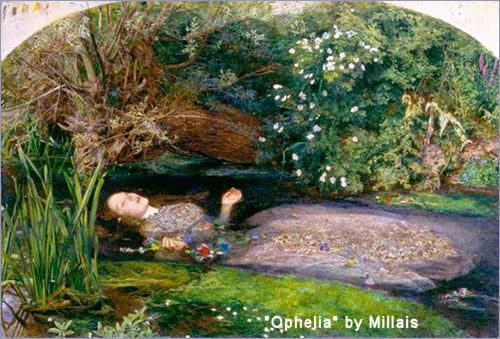
Some people are more equal than others, especially if they are not women
In the Australian Financial Review, September 13, 2011, Deidre Macken writes, “After a week when economic statistics made a lie of our feelings of being worse off, it seems like an opportunistic time to check how good we are at reading ourselves. Obviously we are not good judges at assessing our economic well-being. Repeat after me – we are a lucky people, living in a country that’s never been luckier.”[1]
Without going into the adequacy of the indicators she used but does not reference, was Deidre talking about averaged statistics or was she talking about the way they are distributed throughout the nation?
I chose a quote from a female financial journalist to introduce the feminist implications of the theories of two books. One was published nearly two decades ago and the other was published last year. The earlier one is by Mary Pipher, with the title of Reviving Ophelia: Saving the selves of adolescent girls. It was published by Riverhead Books, New York, 1994. The second book is by Richard Wilkinson and Kate Pickett. It’s title is The Spirit Level: Why Equality is Better for Everyone, and it was published by Penguin in 2010.
Both books are about the impacts of inequality as you and I experience it, rather than the global economics of inequality between different countries by which the first and the third world are often defined. I found these books interesting particularly in the light of the recent inquiry into human rights in Australia, which ignored Australian citizens’ rights by concentrating on international rights. Citizens’ rights require active democracy and laws to facilitate this, whereas global human rights are relative abstractions, requiring recognition by national governments in hard-to-enforce treaties.
The Spirit Level: Why Equality is better for everyone
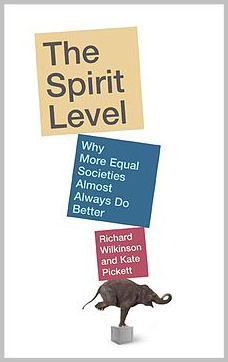
Richard Wilkinson and Kate Pickett in The Spirit Level: Why Equality is Better for Everyone, Penguin 2010 beg the question of defining countries as rich or poor according to their average wealth. The book points out that, although Australia or the United States might have relatively large GDPs for their total populations, large sections of those societies are politically, materially, socially and physically disempowered and disadvantaged by their relative poverty. The authors imply that these differences drive seriously negative outcomes in almost any area you care to think of. The more unequal you are with the people geographically close to you – in your neighbourhood, your state, your nation - the more anxious and dysfunctional you are likely to be. Inequality is actually an indicator of relative unhappiness and that unhappiness is linked to many social and physical ills, including violence and obesity.
Further on we will relate the lesser condition of women as a subclass within these unequal nations.
Wilkinson and Pickett suggest that, rather than comparing “rich countries with poor countries” we should compare rich countries and then look inside them to see how well they are actually looking after their people.
Within countries like Japan and some of the Scandinavian countries … the richest 20 per cent of people are less than four times as rich as the poorest 20 per cent of people. At the bottom of the [scale] are countries in which these differences are at least twice as big, including two in which the richest 20 per cent get about nine times as much as the poorest. Among the most unequal are Singapore, USA, Portugal, the United Kingdom, Australia and New Zealand. (p.16-17)
The book makes no attempt to explain why Portugal should stand out in such a contrast to its continental European neighbours, which almost invariably outperform English speaking countries on equality and social conditions. I would suggest however that one reason lies in Portugal's inheritance laws, which reflect a tendency to disinherit children in favour of spouses, similar to English-style laws. In the other European countries roman-style civil codes provide for children before spouses equally, therefore men and woman come to adulthood with similar wealth.
Wilkinson and Pickett find that the countries with the worst social inequality have the worst social outcomes overall in health, violence, obesity, illiteracy, mental illness, addiction, and rates of teenage pregnancy.
The official message is that developed western countries have done their duty by their own populations in fulfilling their material needs, leaving a remaining task of bringing the poor of other countries up to the same material standard. It seems churlish of people in those first world populations to reproach the rich in their countries for ostentatious and dishonest living, while the poor in the third world suffer malnutrition and disease. The official message is really that the poor of the developed world need to put the needs of the poor of the undeveloped world ahead of theirs, rather than to exert their own rights locally. The normalization of competitiveness over cooperation and social trust is a strategy to justify the growing vast internal inequalities in the first world.
Importantly for Feminism, within these unequal nations there is a further sub-class, and that is the women of those nations.
Female obesity linked to inequality

Most women would be interested to know that the authors, Wilkinson and Pickett, are able to find a clear association between inequality, obesity and the female sex.
The World Health Organisation has found, from a study begun in the 1980s, that in the 26 countries it surveyed, rates of obesity have increased more among poor women than rich women. The countries with the worst inequalities – Australia, the United States, Portugal and the UK, also have the worst rates of obesity. The countries with the lowest rates of inequality have the lowest rates of obesity.(p.98)
Observing a relationship between anxiety and material and social inequality, the authors note that chronic stress stimulates the hormone, cortisol, of which high levels are associated with deposits of fat around the middle.(p.95) People with this kind of fat are at higher risk of other illnesses – notably diabetes. Diabetes is itself associated with depression.
The authors also refer to the concept of the ‘thrifty phenotype’ where birth weights are lower in women who have experienced stress during pregnancy. Are low-birth weight babies likely to squirrel away extra calories because the stress they encountered in utero led them to prepare for a harsh society, where they would expect to struggle for food? Instead, although they do grow up in a harsh society, it is a non-traditional variety where food remains plentiful but love and approval are at a premium. (p.98)
The book also notes that food may stimulate the brain in the same way as addictive drugs do in people who use food addictively. That is, that food may be used as a pain-killer. (p.96)
It is probably obvious that food marketing may also have a role in obesity, but what is that role? The authors find associations between eating for comfort and homely foods which remind people of childhood, but they note that fast food outlets aim to reassure and to provide the lower classes with a feeling of social mobility. They reassure through their reliability and clean surroundings, but they also provide an affordable opportunity to dine out, which was once the province of the rich. Of course when you dine out on fast food, you are taking in huge amounts of calories in the form of fats and sugars, to a degree not found in haute cuisine restaurants.(p.96)
The book also refers to a study which related obesity to people’s subjective sense of ranking low in the social pecking order. That is, how you feel you compare is more important than your absolute living standard.(p.101)
To recapitulate, this book is about how, once the basics are present, absolute living standard is outweighed by social ranking as measured by relative living standard.
Women as a sub-class within unequal first world nations
Importantly for Feminism, within these unequal nations there is a further sub-class, and that is the women of those nations.
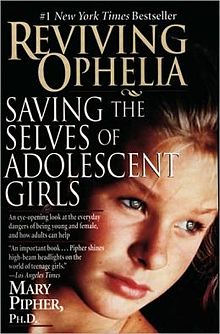
In Mary Pipher’s Reviving Ophelia: Saving the selves of adolescent girls, (Riverhead Books, New York, 1994) the subject is also about inequality and anxiety within high GDP, purportedly progressive societies. Despite the rhetoric, she argues, girls receive a consistent message that they don’t deserve equal treatment and must go to outlandish lengths for mere acceptance. For this reason the whole basis of their identities become at risk as they identify as women rather than as children. They learn that their psychological identities depend on the approval of men. This explains the very high rates of anorexia and risky lifestyles among young women seeking some control over their social and personal environments.
Harking back to Shakespeare’s Ophelia in Hamlet as a young woman who lost the approval of the important males in her life and then suicided, this book observes the increasing difficulty since the 1980s that adolescent girls and the women they become have in preserving a sense of self and self-worth as they transition between childhood and maturity. It finds that they are victims of an increasingly sexualized and pornographic society that defines them almost exclusively as sexual objects, despite the official rhetoric of women’s rights. The girls feel the need to justify themselves against these media popularized and reinforced social standards and, in doing so, to suppress their real feelings and ambitions.
The author observes that, whilst her 1960s generation grew into a western society where the Women’s Liberation movement had overturned official institutional barriers to women’s rights to career, property and political candidacy, the mainstream media preserved, then enhanced over the next decades, a picture of women as inherently less-deserving of these rights than men. Unglamorous, older women (the majority) rarely receive attention in the mass media, and beautiful women often seem only to deserve violent attention, as victims of elaborate predator screenplays. Women are increasingly bombarded by this kind of view at younger and younger ages.
This book, Reviving Ophelia, was published in 1994, at a time when the pervasiveness of the internet was in its relative infancy. Children and the general public were not widely exposed to explicit pornography and sexual sadism in the ‘traditional’ mass media of the industrial age, although these notions were commonly implicit in images and concepts used for marketing all kinds of things. Between that time and now, in 2011, the depiction of women almost exclusively as victims and objects of violence and pornography, explicitly and for that sole reason, has become a global business which operates 24/7. The implicit violence and sexualisation of women in ordinary marketing has also continued. At the same time, the official message is that western women don’t need Feminism anymore because equality has prevailed.
How does a girl, as her sexual personality awakens deal with the saturation marketing of femaleness as moronic and deserving of punishment and death? Mary Pipher argues that girl’s personalities die and that they often die with their personalities.
”Ironically, bright and sensitive girls are most at risk for problems. They are likely to understand the implications of the media around them and be alarmed. They have the mental equipment to pick up our cultural ambivalence about women, and yet they don’t have the cognitive, emotional and social skills to handle this information. They are paralyzed by complicated and contradictory data that they cannot interpret. They struggle to resolve the unresolvable and to make sense of the absurd. It’s this attempt to make sense of the whole of adolescent experience that overwhelms bright girls.
Less perceptive girls may miss the meaning of sexist ads, music and shows entirely. They tend to deny and oversimplify problems. They don’t attempt to integrate aspects of their experience or to ‘connect the dots’ between cultural events and their own lives. Rather than process their experience, they seal in confusion.
Often bright girls look more vulnerable than their peers who have picked up less or who have chosen to deal with all the complexity by blocking it out. Later, bright girls may be more interesting, adaptive and authentic, but in early adolescence they just look shelled.
Girls have four general ways in which they can react to the cultural pressures to abandon the self. They can conform, withdraw, be depressed, or get angry. Whether girls feel depression or anger is a matter of attribution – those who blame themselves feel depressed, while those who blame others feel angry. Generally they blame their parents. Of course, most girls react with some combination of the four general ways.” (p. 43.)
Girls deal with painful thoughts, discrepant information and cognitive confusion in ways that are true or false to the self. The temptation is to shut down, to oversimplify, to avoid the hard work of examining and integrating experiences. Girls who operate from a false self often reduce the world to a more manageable place by distorting reality. Some girls join cults in which others do all their thinking for them. Some girls become anorexic and reduce all the complexity in life to just one issue – weight.” (p.61)
Mary Pipher observes that the loss of confidence in themselves that girls experience as they mature sexually occurs just at the time when more confidence is required to tackle increasingly complex work in the later years of school. Because of this socially-induced lack of confidence, even some highly intelligent girls will give up at the first sign of difficulty, where less bright male students will persist.
The book contains many succinct case histories and concludes with useful ways to approach these problems.
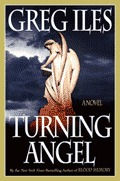
Male treatment of this subject - Turning Angel
How do men deal with these realities that affect their daughters, mothers and intimates so badly? In conclusion, I will mention a book by a man exploring these themes. spirit-level.jpg by novelist, Greg Iles, (Hodder and Stoughton, 2006) is a highly readable thriller that dramatises the stresses of the normalization of sexism and pornography on young girls [and men] in their last years of high school and the particular vulnerability of highly intelligent young women from dysfunctional homes. Iles looks at the temptation for upwardly mobile professional men to exploit such young women. It is also well worth a read and testifies to the continuing usefulness of the novel as a medium for social comment as well as entertainment.
NOTES
[1] Deidre Macken, “I’m starting with the man in the mirror,” Australian Financial Review, September 13, 2011.
How to end the sexual exploitation of women and children without giving up our freedoms
See also: "Pornography and the Celebrity Bestiality Report - Economic trends today" of 21 Aug 09, "Would you like porn with that?" by Catherine Manning of 7 May 09, Federal Government threatens Internet censorship of 16 Nov 08, "Australia facing loss of its language, culture and environmental sustainability to mass immigration" of 26 Jun 09 by Frosty Woodridge.
Sheila Newman's article "Pornography and the Celebrity Bestiality Report - Economic trends today" of 21 Aug 09 and, before that Catherine Manning's article, "Would you like porn with that?" of 7 May 09 have caused me to evaluate my attitudes to pornography and prostitution.
As with prostitution, of which pornography seems to be merely another form, it has become increasingly exploitative in our dysfunctional 21st century world.
How Australian women are being forced to turn to prostitution
One story I heard, maybe roughly 18 months ago now, on Radio National was how a woman, ironically, employed in a 'Human Resources' department, needed to go to University in order to get the degree necessary to get her past the glass ceiling that blocked career advancement for uncredentialled employees.
Unsurprisingly, once she left full-time employment, she didn't have the funds necessary to pay her living expenses. So, like many others in equivalent circumstances, she turned to prostitution.
This kind of story has become so commonplace that many of us don't give it a second thought, but if we do, it is clearly a damning indictment of just what kind of society we have become in the past thirty years, courtesy of the 'free market' 'revolution', as well as high immigration, imposed upon this country by the likes of Fraser, Hawke, Keating, Howard and, now, Rudd, Gillard and Immigration Minister Evans.
Before this 'revolution', nearly all capable and talented people could expect to find relatively easy paths to rise in their chosen career1. People who did not have degrees could still eventually expect to be promoted, and on a few celebrated occasions, all the way to the very top without even having completed High School.
Now that has become practically impossible for nearly everyone who has not had the good fortune to have had parents able to pay their way through University, and have chosen all the correct career moves at the correct moments, without their careers suddenly being set back by retrenchments or other personal misfortune.
Instead, they must not only obtain degrees, but, often, also, a succession of post-graduate qualifications that are deemed current and applicable to their narrow area of expertise, in their own time and at their own expense, and so they are often faced with no choice but to pay for it all by selling their bodies.
About a year before I heard the story of the HR employee who turned to prostitution, I heard another documentary2 on the ABC Radio National featuring a woman in Kalgoorlie. She would have been entitled to a disability pension before John Howard's 'reform' of our Social Security system. After that 'reform' she chose prostitution rather than jumping through all the stupid and demeaning hoops that unemployment benefit recipients are expected to jump through.
On 28 Jun 09,one site visitor, TrueFire commented in response to the article "Australia facing loss of its language, culture and environmental sustainability to mass immigration" by Frosty Wooldridge:
"It's all over the world news about Aussie women now working as prostitutes in record numbers to get by. How gutless can Aussies get? Does anything matter to you? Stand up to your politicians and their backdoor lobbyists."
Will censorship and prohibition make pornography and prostitution any less exploitative?
Prostitution and pornography are only two of many ways that vulnerable women are exploited. The fact that many women choose those livelihoods over working in sweatshop occupations is surely confirmation of that.
Far from reducing exploitation, outlawing or curtailing porn and prostitution is only likely to either force women back into occupations even less acceptable or to make earning a living through prostitution more difficult and hazardous.
A far more effective way to reduce the sexual exploitation of women is to give them back the economic choices that more than a generation of 'free market' ideology and population growth have taken away.3
Is Porn inherently good or bad?
This brings us to that vexed question as to whether we should regard pornography and prostitution as inherently good or bad under more ideal economic and social conditions.
Clearly it meets a need, particularly for people who may be lonely, isolated or socially inept.
As long as no-one is physically or psychologically harmed and no-one is coerced to take part, and as long as children are protected from exposure to it, we should not cast judgement on those adults who choose to either make use of those services or provide those services.
However, about two years ago I found myself nodding in agreement with Clive Hamilton when he argued, as Catherine Manning also rightly does now, that our society has become over-sexualised and that our children, in particular, are exposed to far too much sexual imagery to allow their normal development into adulthood. In a debate on ABC Radio National over the controversy surrounding Bill Henson's exhibition of photos of naked, pre-pubescent children, he posed the question: "Does anyone here seriously believe that we are fighting the same old battles against censorship?" He went on to ridicule any suggestion that we might be faced with a re-run of the old fights to end the ban on "Lady Chatterley's Lover" and implied that those objecting to the ban on the exhibition of Bill Henson's photos of children had exaggerated views of the importance of the issue and of themselves.4
At the time, I, too, found the suggestion ridiculous.
How reasonable objections to the over-sexualisation of our society can be used to increase control over us
However, a few months later in November 2008,I was incensed to learn that Clive Hamilton had, in fact, given his total and uncritical support to Federal Communications Minister Stephen Conroy's plan to impose Communist Chinese style mandatory filtering upon the whole of the Internet in Australia5, ostensibly to prevent access to child pornography. In order to prevent anyone accessing child pornography, every single request for any page anywhere on the Internet, that occured every time someone clicked on a link on a web page, would first have to be compared with a secret database of banned sites. The fact that there were ways that people with more money and/or knowledge could easily evade the filter and the enormous peformance costs that all of us would need to pay did not appear to concern either Hamilton or Conroy.
It turned out that the blacklist could well have included sites containing pornographic material that is currently legal, sites advocating euthanisa, as well as sites deemed 'terrorist' or anything else that the Government considered undesirable.
So, the answer to Hamilton's rhetorical question turned out to be, indeed, 'Yes', after all. We are, indeed, in a sense re-fighting those old battles. This time what is at stake is our freedom to access not just sexually explicit material on the Internet, but potentially any content which a Government might, at some futere date prefer that we do not see.
How could Clive Hamilton, the same person who co-edited the 2007 book Silencing Dissent6, which exposed the Howard Government's systematic suppression of dissenting views, then turn around and push for the adoption of laws to give secretive Government bureaucrats unlimited powers to tell us what we can and cannot view on the Internet? The Internet is the only mass media not currently dominated by corporations.
Clive Hamilton's embrace of the Federal Government's plans for a Communist Chinese7 style Internet firewall demonstrates how reasonable community concerns about the sexual exploitation of women and children can be twisted around in order to allow our Government to extend its control over all of our lives.
This example illustrates how, if we are not very careful, reasonable stances, such as Catherine Manning's objections to children being exposed to pornographic material at corner stores and newsagents, can be seized upon to justify censorship and control way beyond what is actually necessary to fix the problem.
I therefore think it vital that, whenever concerned citizens fight to protect children and to mitigate the exploitation of women, it be made clear that this does not entail support for measures to take away from adults their current rights to access sexually explicit material (as Catherine Manning has in her article).
See also: "Pornography and the Celebrity Bestiality Report - Economic trends today" of 21 Aug 09, "Would you like porn with that?" by Catherine Manning of 7 May 09, Federal Government threatens Internet censorship of 16 Nov 08, "Australia facing loss of its language, culture and environmental sustainability to mass immigration" of 26 Jun 09 by Frosty Woodridge.
Footnotes
1. ↑ In fact, this is a simplification. Before the neo-liberal economic 'revolution', which roughly coincided with the removal of many forms of legal discrimination against women, many women's career choices were limited. Nevertheless, even given the supposed additional freedoms that feminism has brought, many women, now working hard at their paid occupations in order to help their husbands meet massively increased living expenses, particularly housing, as well as attending to household chores, see themselves as worse off, rather than better off, than were their mothers and grandmothers.
2. ↑ Street Stories "Here for the Money" episode of 24 June 2007 currently, as of 22 Aug 09, available as a 14M MP3 file downloadable from here.
4. ↑ The words I write are to the best of my recollection. They may not be precisely a video version of the debate I thought I heard is "Art Censorship And Pornography" dated 26 Jun 08 on the ABC Fora web site.
5. ↑ See "Federal Government threatens Internet censorship" of 16 Nov 08.
6. ↑ Silencing Dissent (2007) edited by Clive Hamilton and Sarah Maddison, Allen & Unwin.
7. ↑ I should acknowledge here that my disparaging use of the adjectives 'Communist Chinese', in the teaser to refer to the Government's planned Internet filtering, was opportunistic. The Government's mandatory Internet filtering plans modeled on the Chinese government's existing Internet filtering system would be more accurately described as 'Stalinist'. In fact a true 'communist' society, whether of the variety that existed prior to the emergence of agriculture, or the form that may have been theoretically possible if the Russian Revolution had not been so thoroughly corrupted by Stalin, would have little need to control its citizens in the way that mandatory Internet filtering appears intended to do.
Pornography and the Celebrity Bestiality Report - Economic trends today
 This article comes from the background research for the Freewaves Feminist Magazine Show on 3RPP Radio Port Phillip, Victoria, Thursday, 20 August 2009. On the show with me was Catherine Manning, who wrote “Would you like porn with that?” for Candobetter, who has started up an internet site focused on removing porn from children’s eye level in stores.
This article comes from the background research for the Freewaves Feminist Magazine Show on 3RPP Radio Port Phillip, Victoria, Thursday, 20 August 2009. On the show with me was Catherine Manning, who wrote “Would you like porn with that?” for Candobetter, who has started up an internet site focused on removing porn from children’s eye level in stores.

Before we did the show together, I did a bit of research into the nature of pornography and why it might be good, or bad. I had difficulty coming to grips with the subject at all for some strange reason. I think that, like a lot of people, I have learned to tune out from the skin-marketing all around me, so focusing on the subject and related issues required an effort. I found a lot of very interesting writing and some very funny blogs.
This is what I came up with.
What is pornography anyhow?
Pornography is not just about getting naked, or having sex, or even recording, depicting or describing it.
The word pornography is made up of the Greek word for ‘prostitute’or ‘sex slave’ – porne- and the word for ‘writing’ graphein. The word pornographos designated a person who writes about prostitutes. Women in Ancient Greek society did not have the status of citizens and slaves had no status at all.
Pornography as we know it today still contains the ingredients of body sale and slavery. Slavery, in many instances these days, is commuted to objectification rather than frank chattel status.
‘Commuted’ in the sense of being paid for. Now you are not owned as a performing slave, but you rent yourself out. The person giving their body to pornography is assumed to be doing so from freedom of choice in order to make money.
Initially the pay for pornography, as in prostitution, may be higher than for other jobs available. Or the pornography may carry, falsely or really, some acting or modelling component and may be seen as an opportunity to get into something more skilled.
Pornography offers the vendors profits where none might otherwise exist. The ability to turn the girl next door, the schoolgirls on the bus-stop, your wife, daughter or girlfriend into cash may be very hard to knock back.
In the absence of women taking more control of their own incomes, including ownership of land and assets, the only thing stopping third parties from making a living this way would be a moral code to resist assisting the exploitation of women and their public exhibition of their bodies, which is generally deemed to be demeaning and damaging, unless it is artistic, which is to say, not titillating.
Some women would say that pornographic work is only damaging because women are seen to be objects owned by men and renting their bodies out for any purpose lowers the value of the object.
Can a woman enjoy displaying her body in a provocative pose to an unknown range of anonymous magazine browsers? The associated notoriety has become more and more apparently acceptable in public mores, possibly due to the expansion of visual media and the associated expansion of profit opportunities.
Who makes the money out of pornography?
So, why don’t men do it with their bodies too? Or is their main role as agents, salesmen and owners?
Who makes the most money out of pornography – the women who pose or the men who sell it? Obviously the employer has to stand to make more than the subject of the picture or there would be no profit in it.
It is said that one of the richest men in the world, Rupert Murdoch, made a lot of his money out of his famous ‘Page 3’ girlie photos at a time when the print media were constantly expanding.
The divisions and oppositions by gender in our species are political and economic
Steve Biddulpf writes that:
“Boys have many positive impulses around sexuality. Deep down most teenage boys are deeply romantic, capable of quite spiritual feelings towards women and girls.” (Steve Biddupf, “How we turn boys into creeps.”)
But the domination driven culture of capitalism undoes them.
A man with a big car and a couple of semi-naked young women sitting on it looks rich and successful to other men, according to Ape and marketing logic.
A woman surrounded by young naked men would also look rich and successful, as if accompanied by slaves, but we don’t see this so much. This is probably because our society is dominated by men who reject the popularization of women with male slaves. Why? Because we are against male slavery and its portrayal. But not that of women.
Catherine Manning’s concern that young girls will early identify as inevitable the public sexualisation of their gender as objects has deeper significance than ‘mere’ psychological trauma. With the huge expansion in volume and exposure of pornography, the risk is of the perpetuation and exacerbation of the attitudes that underlay the slave societies of Ancient Greece and England and her colonies before the 20th century, where women had no rights to property or citizenship and could not even have custody of their children in the event of a divorce.
Does it seem too way out to imagine our society being prepared for such a future? Think of how Russia has become a source of prostitution for the world with the simultaneous arrival of the capitalist press and economic decline. And South East Asia.
Mr Murdoch as a porn hustler; more than just an industry
Consider the influence that Mr Murdoch, the man who designed the Page 3 girls to become our social norm, now has on the production of political parties and leaders in Australia and throughout the English-speaking world, and even, more and more, in Europe.
Consider his influence on our dogma of economic and population growth, commodification and privatization, his impact on food habits and acquired cultures and values.
Could this kindly old man, solid patriarch and deliverer of Boyer Lectures really be the same man who brought the English-speaking world the Page 3 soft porn? Well, if that’s the worst he can do, is it any big deal?
I wonder if, however, in his vast network empire, Murdoch ever thought about investing in something a little more sophisticated?
Well, as it happens, Newshounds Are Us at www.newshounds.us/ (an online news-site which arose with the original researchers for the film Outfoxed about Fox TV) report in 2009 that Rupert Murdoch,
“… the born-again Christian who chairs media giant News Corporation, has been secretly building a stable of wholly-owned pornographic channels for his BSkyB subsidiary. The Business has learnt that BSkyB now owns and operates its own pornographic channels – the 18+ Movies selection – after years of hosting third-party content only. The company has also been entering into partnerships with companies that broadcast pornographic television channels on BSkyB, such as Sport XXX Babes, XXX Housewive and Playboy. BSkYB has agreed retail distribution agreements with these companies. With Playboy, for instance, BSkyB now not only hosts the channel but sells its service, and collects and shares in the revenues from Playboy customers.”
They further inform us of another old man who owns newspapers and made a fortune from pornography, saying that,
“For years the Murdoch press has labelled rival newspaper baron Richard Desmond a pornographer in articles charting his business which has included pornographic magazines and TV channels.” http://www.newshounds.us/2006/02/12/rupert_murdochs_pornography_profiteering.php
Desmond owns the Daily Express and OK magazine.
Silvio Berlusconi’s personal control over Italy’s ideas is even more direct. He is the Prime Minister of Italy, in the first place, but has been estimated to have personally
[…]The hallmarks of Mediaset television are blizzards of commercials, interspersed with AC Milan soccer matches – Berlusconi is the team's owner – game shows, "reality TV" serials and vaudeville extravaganzas featuring leggy troupes of scantily-clad young women.”
Berlusconi also
“controls more than a third of all book and magazine publishing and a leading national newspaper.”
Source: Frank Viviano, CBS5, “The Resurrection Of Silvio Berlusconi.”
But wait, there’s more: A report called, “The Porn Standard, Children and Pornography on the internet”, found that the “large and lucrative internet pornography industry is flooding the Web and seeking mainstream acceptance.”
It also found that
“The online pornography industry generates $12 billion in annual revenue roughly equal to the annual revenue of ABC, NBC, and CBS combined”[…], and, that “The two largest purchasers of [internet] bandwidth [space] are companies in the adult entertainment industry.
Household names in manufacturing own these global investments in Porn:
“The report found that, already in the year 2000, “General Motors Corporation (through its subsidiary DirecTV®) was selling more pornographic films each year than Larry Flynt of Hustler®. EchoStar Communications, which is heavily backed by Rupert Murdoch, now generates more revenue from pornography than Playboy®.
Other major players in the pornography business today include AT&T®, Hilton®, Marriott International. [Source: Sean Barney, “The Porn Standard: Children and pornography on the internet,” http://www.thirdway.org/products/14]
Maybe we looking at a porn-led international economic recovery?
So is this where the banks and big corporations are investing our funds now? Are they aiming for a porn-led global financial recovery?
If this phenomenon is so pervasive, so irrestistible, and it relies so much on women’s bodies, how come we are still letting a bunch of old men run our show?
If there is so much money in pornography, shouldn’t the women and children who wear the costs at least get control of the profits – not to mention the industry? Go here for the Celebrity Bestiality report on making money out of porn. That report concludes that only the big investors get anything out of the business.
Corporations and governments in the old-fashioned role of pimps
This is where we came in: Female gender slavery and prostitution make money for the masters, not for the individuals who perform the work.
Pimps tend to be men who are able to attract a few women by fair or foul means, but who are not too fussed about renting them out for sex. Perhaps this is one of the ways in which capitalism began.
Did the case ever happen where women were able to attract men and then were not too fussed about renting them out for sex? To whom? In capitalist societies women generally did not own anything, whereas men were able to own them. It therefore seems that the tendency for many more women to be prostitutes than men probably resulted from women’s marginalization and then further marginalized them.
But are women’s bodies the only ones objectified like this? No, pornographic objectification happens to men and to children of both sexes, although in the latter case it is not yet deemed acceptable.
Male gender slavery and objectification in war
And there is another way in which men are objectified by the same kinds of commercially organized forces which is just as demeaning and destructive – and that is in war. In war young men are convinced or forced to risk their bodies, minds and lives for the sake of profits, yet told that what they are doing is honorable.
And women and children suffer in war of course as well, often in pornographic ways that are beyond ordinary imagination.
Porn and war seem to be human issues of economic and political disenfranchisement in contexts of removal of power to distant locations and persons who do not have to face the people who wear the consequences.
Another argument in favour of relocalisation.
.
That’s not the end of it, but here’s a good song to pause on – “JPEG Baby”. It's sung by the writer of the Celebrity Bestiality report.
Send us your thoughts in a comment.
And maybe take a look at http://www.sayno4kids.com/blog/ - Catherine Manning’s page proposing simply moving pornographic magazine displays to above children’s eye-level.
Would you like porn with that?
Article written by Catherine Manning

I am not a prude, but my children have a right to childhood
I am not a prude. (I know, it's a shame that women have to clarify that point before commenting on pornography, but just before you grab your keyboard to type a response, I am not opposed to adults accessing legal pornography.) What I am opposed to, is children being exposed to pornographic images in milk bars, service stations and newsagents.
We have a great local store. The vendor takes the time to serve the children of our community one by one as they choose their lollies the 'old fashioned way', and as if they're making the biggest decision they'll ever make in their lives. My kids look forward to their once a week treat, and I enjoy helping to foster what I think will one day be a positive childhood memory.
However, last week as I stood waiting for an order with my four year old son, I noticed at children's eye level two magazines with almost naked, unnaturally busty, spread legged, pubeless 'women', faces with parted glossy lips wantonly staring out as they pull down their knickers, just beside the icecream freezer right in front of us. With headlines such as 'Fit to F*#K', World's Oldest Porn Star', 'Keep on F*#king','Porn star goes down on chopper pilot's chopper', etc., there wasn't much left to the imagination. (hey, if you're freaking out reading this, imagine how I felt with my child in tow.)
Does the right to make money cancel out my children's rights?
I spoke with the storekeeper about this, and although he understood my concerns, his job was to make money. In fact, he informed me that many of his clients, the truckies passing through who park out the front of our primary school, actually think he should stock more of the 'hardcore stuff'. (gee, that's comforting I say as I push my stomach back down from the back of my throat....). Apparently, according to the storekeeper, less offensive magazines such as Ralph and FMH do come covered, but these two, which have progressively become more explicit, have escaped the same censorship. Therefore, the storekeeper (and anyone else) can have these magazines sitting anywhere in their shop and as in our case, right between the lollies and icecreams about half a metre from the floor. (Have an icecream kids, and would you like porn with that?)
Our children are victims of pornography
Our children are victims of pornography. They are being exposed to images of a sexual nature long before they can comprehend their meaning, but these images make an impression. It tells boys what to expect of girls and tells girls how they should act. We have a society full of girls and young women with eating disorders and serious body image problems, and a fast growing cosmetic surgery industry (which cashes in unashamedly on those with body image issues). We have what seems like an 'epidemic' of paedophilia, with more and more men accessing sexual images of children. The news is full of stories about footballers physically and sexually assaulting women, yet society still allows our kids to be brainwashed with pornographic images at an early age.
I'd like to know that when my kids go in to the local store for a bag of lollies or some milk, that they are safe and not exposed to things they shouldn't and wouldn't see at home. Sadly, I've come to learn it's something I shouldn't 'expect', but surely it's not too much to ask.
About the author:
This article is by Catherine Manning, President of the Southern Victorian Community Action Group Inc, and the newly formed Cardinia Township Association, and an ordinary parent/citizen concerned about the future for our children, in this case, the impacts of inappropriate exposure to pornography.
Big Brother Internet proposal - Questions for Conroy
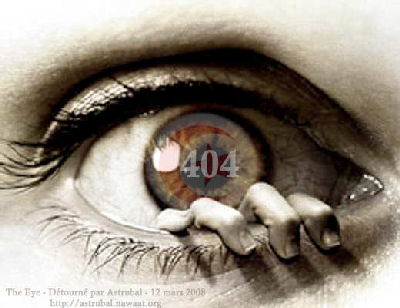
(original picture at http://astrubal.nawaat.org/index.php?tag=freedom-of-expression
There is also a great video there about the internet and amnesty international)
The Senate, Parliament of the Commonwealth of Australia:
Questions on notice about internet censorship to Sen. Conroy, Min. for Broadband
Thursday 27 Nov. 2008. Notice paper No. 47 Pp 60-61
http://www.aph.gov.au/Senate/work/notice/snpf_047.pdf
Senator Ludlam, of the West Australian Greens, is almost alone in asking questions about Sen. Conroy's bizarre proposal to police what we read and watch on the internet without letting us know the details. His investigations on our behalf need to be publicised.
Here they are:
Senator Ludlam: asks the Minister for Broadband, Communications and the Digital Economy questions about the recently announced 'live pilot' of Internet content filtering:
(1) Why does the pilot aim to test the impact of filtering on Internet connections ranging up to 12 Mega bits per second (Mbps) when 12Mbps is the minimum speed which the National Broadband Network project is claimed to deliver.
(2) Why will the pilot test the capacity of the filters to 'detect and provide warnings on circumvention attempts'.
(3) What is meant by 'provide warnings on circumvention attempts'.
(4) Does the Government propose, or is it considering, the criminalisation of circumventing or attempting to circumvent the proposed filtering regime.
(5) Will Internet Service Provider's be required, or permitted, to apply any level of filtering to the Internet connections of people who have not volunteered to participate in the pilot.
(6) If the customers participating in the pilot are volunteers, how will the results of the pilot be of any worth when they will be affected by self-selection bias.
(7) How does the Government propose to prevent technological tools such as proxies, Virtual Private Networks, the Tor service and encryption from being used to circumvent the Government's filtering regime without adversely affecting the ability of Australian businesses and residents to conduct their online business in a safe and secure fashion.
(8) Are technological tools such as Virtual Private Networks, Peer-to-Peer applications and encryption, being used by persons trafficking in child pornography online; if so, how will the Government's proposed filtering regime prevent this.
832 Senator Ludlam: To ask the Minister for Broadband, Communications and the Digital Economy-
(1) On what basis does the Government claim that Internet service provider (ISP)-based filtering is more effective than personal computer-based solutions.
(2) What is the Government's justification for making the dynamic content analysis filtering component of the regime opt-out rather than opt-in.
(3) Why is it necessary to compel all Australian ISPs to supply a filtered Internet service when there are already some ISPs offering such a service in the market.
(4) If the demand within the Australian public for filtered Internet connections from their ISP exists as claimed by the Government, why has this not manifested itself in the market to date.
(5) What evidence does the Government have to support the claimed public demand for filtered Internet connections.
(6) Can details be provided of organisations that have assisted the department through providing advice, information and examples that have contributed directly to the Government's proposed filtering plan.
833 Senator Ludlam: To ask the Minister for Broadband, Communications and the Digital Economy-
(1) What is the current number of Uniform Resource Locators (URLs) on the Australian Communications and Media Authority's (ACMAs) list of overseas-hosted prohibited or potentially-prohibited content.
(2) How many unique domain names are within the URLs which are currently on the ACMA blacklist.
(3) (a) How many active URLs are currently on the ACMA blacklist; and (b) of these, how many have been, or in the ACMA's view would be:
(i) classified MA15+, (ii) classified R18+, (iii) classified X18+

Recent comments